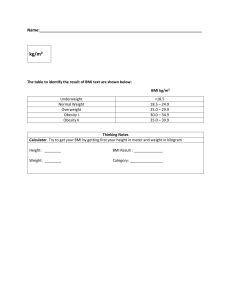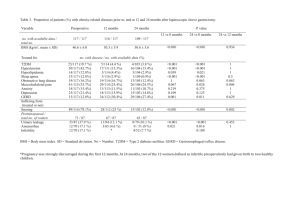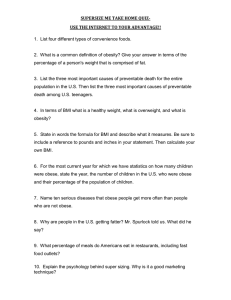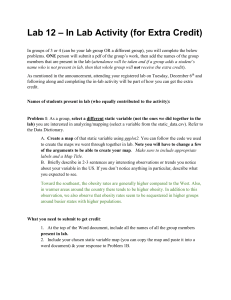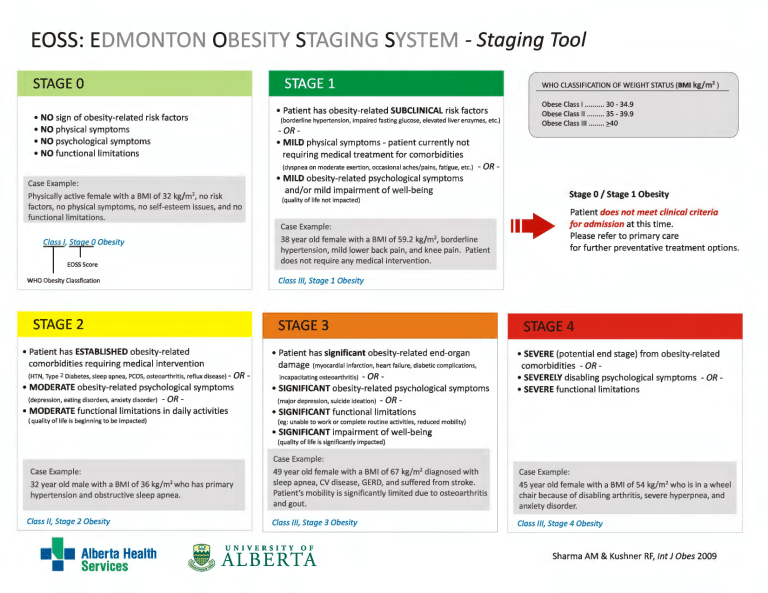
EDMONTON OBESITY STAGING SYSTEM - Staging Tool STAGE 0 • • • • STAGE 1 NO sign of obesity-related risk factors NO physical symptoms NO psychological symptoms NO functional limitations • Patient has obesity-related SUBCLINICAL risk factors (borderline hypertension, impaired fasting glucose, elevated liver enzymes, etc.) - OR• MILD physical symptoms - patient currently not requiring medical treatment for comorbidities (dyspnea on moderate exertion, occasional aches/pains, fatigue, etc.) - Case Example: Physically active female with a BMI of 32 kg/m2, no risk factors, no physical symptoms, no self-esteem issues, and no functional limitations. C r I, Str O Obesity EOSS Score WHO Obesity Classfication STAGE 2 • Patient has ESTABLISHED obesity-related comorbidities requiring medical intervention (HTN, Type 2 Diabetes, sleep apnea, PCOS, osteoarthritis, reflux disease) - OR • MODERATE obesity-related psychological symptoms (depression, eating disorders, anxiety disorder) - OR • MODERATE functional limitations in daily activities ( quality of life is beginning to be impacted) WHO CLASSIFICATION OF WEIGHT STATUS (BMI • MILD obesity-related psychological symptoms and/or mild impairment of well-being kg/m 2 ) Obese Class I .......... 30 - 34.9 Obese Class II ......... 35 - 39.9 Obese Class Ill ........ ,".40 OR - (quality of life not impacted) Stage OI Stage 1 Obesity Case Example: Patient does not meet clinical criteria for admission at this time. Please refer to primary care for further preventative treatment options. 38 year old female with a BMI of 59.2 kg/m2, borderline hypertension, mild lower back pain, and knee pain. Patient does not require any medical intervention. Class Ill, Stage 1 Obesity STAGE 3 • Patient has significant obesity-related end-organ damage (myocardial infarction, heart failure, diabetic complications, incapacitating osteoarthritis) - OR • SIGNIFICANT obesity-related psychological symptoms (major depression, suicide ideation) - OR • SIGNIFICANT functional limitations • SEVERE (potential end stage) from obesity-related comorbidities - OR • SEVERELY disabling psychological symptoms - OR • SEVERE functional limitations (eg: unable to work or complete routine activities, reduced mobility) • SIGNIFICANT impairment of well-being (quality of life is significantly impacted) Case Example: Case Example: 32 year old male with a BMI of 36 kg/m 2 who has primary hypertension and obstructive sleep apnea. .,. Class II, Stage 2 Obesity • Alberta Health Services 49 year old female with a BMI of 67 kg/m 2 diagnosed with sleep apnea, CV disease, GERD, and suffered from stroke. Patient's mobility is significantly limited due to osteoarthritis and gout. 45 year old female with a BMI of 54 kg/m 2 who is in a wheel chair because of disabling arthritis, severe hyperpnea, and anxiety disorder. Class Ill, Stage 3 Obesity Class Ill, Stage 4 Obesity Case Example: Sharma AM & Kushner RF, Int J Obes 2009
